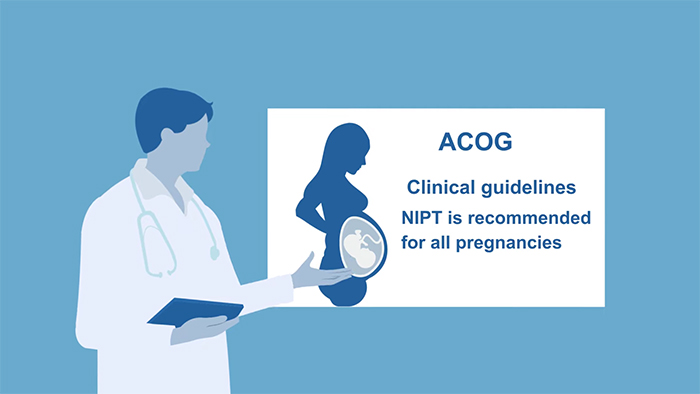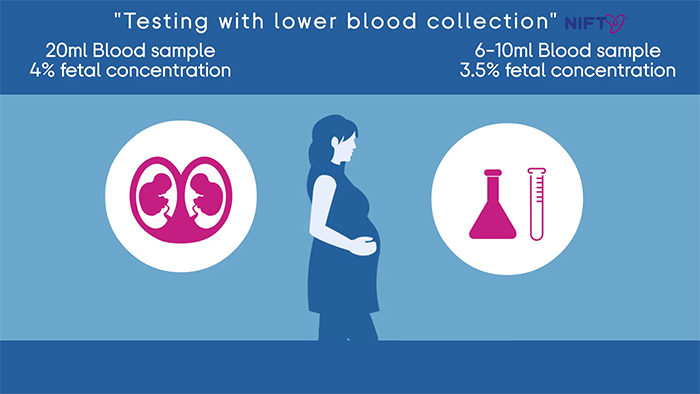What parents need to know about prenatal tests | BGI Perspectives
2022-10-26
Expecting parents are often advised by their doctors from the department of gynecology and obstetrics to consider noninvasive prenatal tests (NIPT). Parents have many questions with regard to the potential benefits of prenatal screening as they seek to better understand the health status of the mother and baby. To assist in this process, BGI Genomics, one of the world’s leading providers of NIPTs, interview our in-house experts to answer these questions.
What are these noninvasive prenatal tests (NIPT)?
Why is NIPT considered a noninvasive test?
NIPT, also known as noninvasive prenatal screening (NIPS), is a screening test for evaluating the risk that the fetus will be born with certain genetic abnormalities or chromosomal disorders, such as Down syndrome (trisomy 21), Patau syndrome (trisomy 13), and Edwards syndrome (trisomy 18).
This testing analyzes small fragments of DNA that are circulating in a pregnant woman’s blood, which was called cell-free DNA (cfDNA). NIPT is considered noninvasive because it only requires drawing blood from the pregnant woman to test whether a fetus has a genetic condition and does not pose any risk to the fetus, giving expecting mothers the greatest peace of mind with a single blood draw.
Who should opt for NIPT?
New guidelines from the American College of Obstetricians and Gynecologists (ACOG) recommend that Non-Invasive Prenatal Testing (NIPT) be made available to all pregnant women, regardless of maternal age or baseline risk.
NIFTY – BGI Genomics NIPT solution – is suitable for most pregnant women from week 10 of pregnancy except for a few special cases. BGI Genomics is committed to serving more pregnant women with different reproductive backgrounds, such as singleton pregnancies, twin pregnancies, and in vitro fertilization (IVF) pregnancies.

The American College of Obstetricians and Gynecologist guidelines recommend NIPT for all pregnancies.
What conditions can NIPT screen for?
It's important to know that NIPT is a screening test — not a diagnostic test. This means that it can't diagnose a genetic condition with certainty. It can, however, predict whether the risk of a genetic condition is high or low.
NIFTY offers comprehensive prenatal screening options, including Trisomy 21, Trisomy 18, Trisomy 13, Sex Chromosome Aneuploidies (XO, XXY, XXX, XYY), Rare Autosome Aneuploidies (Trisomy 9, Trisomy 16, Trisomy 22), and other aneuploidies.
Can NIPT be extended to screen for a wider range of diseases?
BGI Genomics is working on improving screening technologies and decreasing costs of sequencing and analysis to significantly expand the scope of prenatal screening beyond common autosomal aneuploidies such as copy number variations (CNVs).
The number of copies of small sections of our genomes can have big consequences and evidence is accumulating that CNVs play important roles in human disease. NIFTY Pro can assess the risks of 84 types of CNVs now and we are working to expand the scope of CNV detection.

NIFTY's well-established technology offers high accuracy and flexible sample requirements.
What is chorionic villus sampling (CVS) and amniocentesis?
CVS is a prenatal test in which a sample of chorionic villi is removed from the placenta for testing. The sample can be taken through the cervix or the abdominal wall.
Amniocentesis is a procedure in which amniotic fluid is removed from the uterus for testing or treatment. Amniotic fluid is the fluid that surrounds and protects a baby during pregnancy.
CVS and amniocentesis are diagnostic tests that can determine, with as much certainty as possible, whether a specific genetic disorder or condition is present in the fetus.
Both tests are invasive procedures carrying various risks to the expecting mothers and fetus including the risks of miscarriage, needle injury, infection, etc.
How is the expecting mother's privacy safeguarded?
The information and NIFTY test results of the patient are kept confidential and all data will remain anonymous during analysis. Only the patient’s healthcare provider will receive the test results.
BGI Genomics will retain personal data for no longer than necessary to provide these test services, please read the BGI Genomics Privacy Policy for additional details. For any privacy concerns, please contact BGI Genomics through BGI_INTL_GDPR@bgi.com at any time.
Additional Reading
Whole Genome Sequencing is a more comprehensive prenatal test l BGI Perspectives
How Noninvasive Prenatal Testing (NIPT) can help expecting parents l BGI Perspectives
Nutrition and Prenatal Tests are Vital for Future Parents l BGI Perspectives
How the latest treatments and prenatal tests help with infertility problems l BGI Perspectives
About NIFTY®: Non-invasive prenatal testing
To learn more about the NIFTY® Test - the world's leading non-invasive prenatal testing (NIPT), please see our website. The NIFTY Test is suitable for pregnant women from 10 weeks of pregnancy, with an estimated turnaround time of under seven days. There are over 10,000,000 NIFTY samples processed as of 2021.
About BGI Genomics
BGI Genomics, headquartered in Shenzhen China, is the world’s leading integrated solutions provider of precision medicine. Our services cover more than 100 countries and regions, involving more than 2,300 medical institutions. In July of 2017, as a subsidiary of BGI Group, BGI Genomics (300676.SZ) was officially listed on the Shenzhen Stock Exchange.